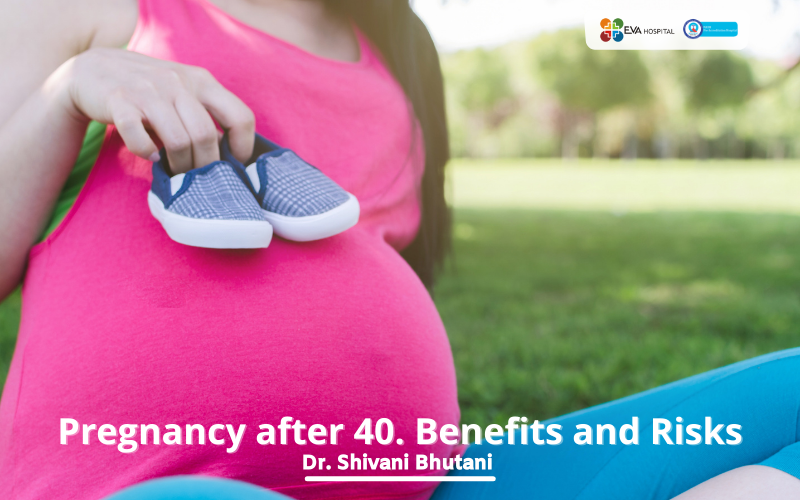[vc_row el_class=”cstm_container”][vc_column][vc_column_text]Pregnancy & childbirth after the age of 40 has become an increasingly common affair. The number of first-time births among women ages 40 to 44 has increased substantially.
But many questions come to mind when couples decide to have a baby at a later age.
What are the Benefits?
Having a baby later in life can have more advantages than having children early, sometimes.
Already having established a career, you may be able to dedicate more time to raising children or the financial situation can be more favorable.
Steady relationship status may make you want to have a baby at this age.
These are some more possible benefits, of having babies after 40 including:
- Reduced mental decline
- extended life span
- better academic outcomes in children, such as higher test scores and graduation rates
What Will the Pregnancy Be Like?
The advances in technology concerning fertility, pregnancy, and delivery, have made it possible to safely have a baby at the age of 40.
Nonetheless, Conception and Pregnancy can be more challenging as you age this pregnancy after age 40 is deemed as high risk.
It’s important to talk to your gynecologist in Ludhiana about what you can expect during your pregnancy based on your age and overall health.
How Does Age Affect Fertility?
Women’s fertility rate drops considerably after a certain age and they experience fertility issues due to the following risk factors that increase with age:
- More chances of health conditions that can inhibit fertility
- Significant decrease in Ovarian Reserve or egg cells.
- Improper release of eggs by the ovaries
- An age-based decline in egg quality lessens the viability of fertilization for the eggs released by the ovaries as women age.
- Chromosomal abnormalities due to the age of the egg may result in incorrect implantation of the embryo in the uterus causing miscarriage or Down syndrome in pregnancy.
Conception can take some time, regardless of age. But most women after 40 can’t get pregnant naturally and for those who have been trying unsuccessfully to have a baby naturally for more than six months, it may be time to see a fertility specialist.
An experienced fertility specialist like Dr. Shivani Bhutani at Eva Hospital can run tests to discern whether there are factors that are affecting one’s ability to get pregnant, and can suggest treatments to increase the chances of getting pregnant.
Read more:-Is 40 too late for IVF?
Genetic conditions
There are more chances of older women to give birth to a child with a genetic condition such as Down syndrome.
Talking to the doctor about the possibilities of these problems will help you ascertain what can be done about it.
Some tests can be recommended by the doctor but they’re a personal choice. These tests include screening like an early ultrasound and a blood test.
In case of heightened likelihood of the problem, one can have a diagnostic test such as chorionic villus sampling and amniocentesis.
Genetic counseling can also be arranged, where a specialist counselor talks about family and about what might happen with your baby, and about how the situation can be handled.
Treatment
An urgent and individualized treatment approach is important for women who are trying to conceive and are over 40 years of age. The sooner treatment is started, the higher are a woman’s chances of pregnancy are.
Among the several types of infertility treatment available to women over 40, it is important to remember that some of the treatments offered by fertility centers may not be the best option for women over 40 due to.
IVF and donor eggs are far more effective treatments for women over 40 than “mini IVF” and IUI that give vastly poorer pregnancy likelihood for older women.
IVF is a proactive and contentious treatment philosophy to maximize each woman’s chance of pregnancy.
For women looking to conceive with their own eggs after age 40, IVF with ovarian preparation stimulation is the fastest and most credible treatment option.
The women older in age opting for IVF need a different treatment than the younger women. Eva Hospital has had very impressive pregnancy rates even at very advanced maternal ages, as well as for those with largely diminished ovarian reserve
Other Risk Factors
Also chances of Vaginal delivery decrease after the age of 40, primarily due to the fertility treatments that can enhance the risk of premature birth.
There may also be an increased risk of preeclampsia, which may make cesarean delivery imperative to save both mother and baby.
The process of vaginal delivery can also be more challenging after 40 and there is an increased risk of stillbirth.
However many women deliver healthy babies at or over the age of 40 successfully. A doctor can guide you about what to expect, and come up with a backup plan.
Like, in case you’re planning a vaginal delivery, discuss it with your doctor.
Takeaway
Giving birth to a baby at 40 is very common these days, so if you’ve postponed having children until now, you can plan one.
Despite the challenges it may take to conceive, having healthy children in their 40s is certainly a possibility with a well-formulated IVF plan by a competent doctor.
Talk to your doctor about all your risk factors before starting a family at this stage in your life.
Dr. Shivani Bhutani at Eva Hospital has been assisting many couples over the age of 40 to have healthy children and she can guide you about the pregnancy at the age of 40.[/vc_column_text][/vc_column][/vc_row]




